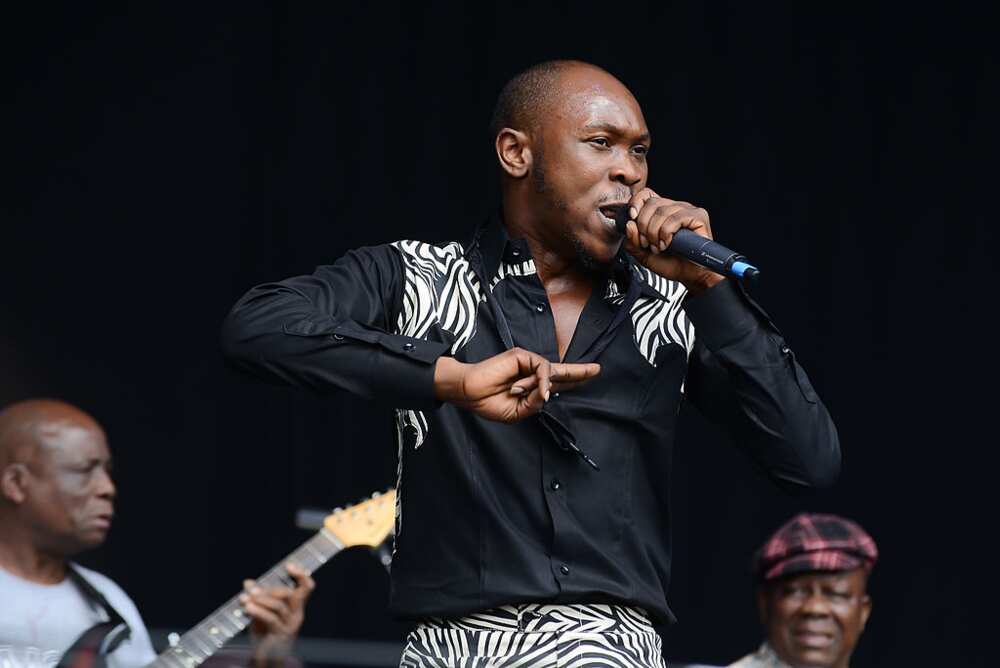Afrobeat star Seun Kuti urges African governments to ban Kemi Badenoch, UK Conservative Party leader, from visiting the continent.
His demand follows controversial remarks Badenoch made about Nigeria that have sparked outrage and debate.
In a recent Instagram live session, Kuti expressed his frustration with Badenoch’s comments, accusing her of insulting Nigeria, its people, and its history. He urged African leaders to take action against what he described as disrespectful and offensive statements.
Kemi Badenoch, who serves as the UK Secretary of State for Business and Trade, has reportedly described her upbringing in Nigeria as a difficult experience marked by fear and insecurity. She also alluded to systemic corruption as a defining feature of the country.
Despite criticism from Nigeria’s Vice President Kashim Shettima and other prominent figures, Badenoch has stood by her comments, further inflaming tensions.
Critics argue that Badenoch’s remarks misrepresent Nigeria and reinforce harmful stereotypes about Africa. Her comments have particularly drawn the ire of Seun Kuti, who described them as an insult not only to Nigeria but to the continent at large.
During his live session, Kuti did not hold back in criticizing Badenoch. He accused her of disrespecting Nigeria’s ancestors and history, citing statements she allegedly made suggesting Africans owe reparations to Europeans for colonialism.
“Many people have been praising this woman, but she has been insulting us, our ancestors, and everything we stand for,” Kuti said. “She claims we should pay Europeans for colonialism—for killing millions of our people and for the atrocities committed on our land.”
He went on to call for drastic measures. “She should be banned from entering Africa. And if she does step foot on African soil, she should be jailed,” he added, visibly frustrated.
The controversy surrounding Badenoch’s remarks has reignited conversations about how African countries are perceived on the global stage. Many Nigerians and Africans have expressed dismay at what they see as a lack of understanding and respect for the complexities of their societies.
On social media, Badenoch’s comments have drawn mixed reactions. Some argue that she was merely speaking from her personal experience and has a right to share her perspective. Others believe her statements lack nuance and fail to acknowledge the progress made in Nigeria and other African countries.
Kuti’s reference to colonial reparations has further fueled the discussion. The idea that Africans should compensate Europeans for colonialism has been dismissed as outrageous and deeply offensive by many. Critics argue that colonialism brought untold suffering, exploitation, and the destruction of African societies.
Historians and activists often highlight that European powers owe reparations to Africa for centuries of plunder, slavery, and systemic oppression. Against this backdrop, Badenoch’s alleged remarks have been viewed as a stark reversal of this narrative, further angering individuals like Kuti.
Beyond his criticism of Badenoch, Kuti’s comments reflect a broader frustration with how African leaders handle such incidents. He urged governments across the continent to unite and take a stand against disrespect and exploitation.

“For too long, we have allowed outsiders to come here, disrespect us, and walk away without consequences,” Kuti said. “It’s time for Africa to rise, to defend its dignity and history.”
His remarks echo a growing sentiment among Africans who are calling for greater self-respect and assertiveness on the global stage.
While Kemi Badenoch has not directly responded to Kuti’s comments, the controversy has undoubtedly sparked wider debates about identity, history, and representation. It has also highlighted the growing influence of public figures like Seun Kuti in shaping political discourse.
As African nations grapple with their post-colonial realities, the question remains: how should they respond to criticisms and stereotypes, especially from individuals with African heritage?
For now, Kuti’s passionate call to action has amplified the conversation, reminding many of the importance of preserving Africa’s dignity and standing up against perceived disrespect. Whether African governments heed his call remains to be seen, but the debate sparked by this incident is unlikely to fade anytime soon.
Read Also: Seun Kuti Discusses Davido Wedding Snub
Sex is a Mutual Act, Not a Favor – Seun Kuti



